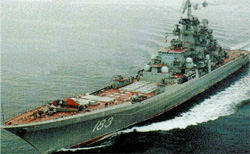| Tell a friend | Print version |
|---|
Russia to expand naval presence in the Mediterranean Sea
Source: , author: RIA Novosti military commentator Ilya Kramnik
Peter the Great
A squadron comprising the nuclear-powered battle cruiser Peter the Great, the anti-submarine warfare (ASW) ship Admiral Chabanenko and two supply ships from the Russian Navy's Northern Fleet recently entered the Mediterranean Sea.
The squadron was joined there by the Russian Baltic Fleet's escort ship Neustrashimy (Intrepid) and a Black Sea Fleet tanker Ivan Bubnov.
For the first time since the break-up of the Soviet Union, Russia has reinstated a scaled-down version of the famous Fifth Squadron comprising warships from the three "western" fleets" that had sailed the Mediterranean in the U.S.S.R.'s heyday.
After exercising in the region, the Northern Fleet squadron will sail to Venezuela. The Neustrashimy will go to Somalia; and the empty Black Sea Fleet tanker will return to her home base in Sevastopol.
For over 200 years, the Mediterranean Sea has played an important part in Russian history. During the Russo-Turkish War of 1768-1774, Admiral Grigory Spiridov (1713-1790) commanded a naval squadron that defeated the Turkish fleet during the battles of Chios Strait and Cesma Bay in July 1770.
The subsequent blockade of the Dardanelles Strait facilitated Russia's eventual victory in the war.
Throughout the early 19th century, the Russian Navy operated in the Mediterranean Sea. However, France and the United Kingdom defeated Russia in the 1853-1856 Crimean War. Under the 1856 Paris Peace Treaty, Russia was forced to scrap its Black Sea Fleet and could only dispatch Baltic Fleet squadrons to the region.
Russian expeditions had both psychological and practical implications. Famed English writer, poet, soldier, courtier and explorer Sir Walter Raleigh (1552-1618) used to say that those who owned the sea controlled global commerce, while those controlling global commerce owned the Earth and its riches.
This may be an overstatement which, nonetheless, reflects the real situation. Naval superiority facilitates unimpeded merchant-marine traffic and makes it possible to destroy enemy shipping.
British and U.S. naval superiority was a major factor of the Allied victory in both world wars.
In peacetime, naval superiority provides substantial commercial advantages to individual countries or groups of countries.
Since the late 16th century, the Anglo-Saxon world, namely, the United Kingdom and the United States, have dominated the seven seas.
Although Russia has never aspired for naval superiority, it has always tried to maintain a navy capable of undermining superior enemy forces.
In the 19th and 20th centuries, Russian expeditions to the Mediterranean Sea tried to undermine British and Turkish naval superiority. In case of war, Russian squadrons were to have attacked British shipping, while avoiding superior enemy forces. If a war broke out with Turkey, they were supposed to support the Black Sea Fleet's operations aimed at blockading and seizing the Bosporus and the Dardanelles Straits.
International strategies changed with the advent of long-range missiles, nuclear weapons and aircraft carriers. After World War II, Soviet naval squadrons stationed in the Mediterranean Sea were ordered to pin down and destroy NATO carriers and strategic missile submarines in case of a hypothetical conflict, thereby preventing them from hitting targets in the U.S.S.R.
Although tensions have relaxed since the Cold War, and though the United States has scaled down its naval presence in the Mediterranean Sea, this theater of war linking Europe, Asia and Africa retains its key importance.
Moscow, which is showing its naval flag between Port Said in Egypt and the Strait of Gibraltar more and more frequently, obviously realizes the region's strategic importance.



